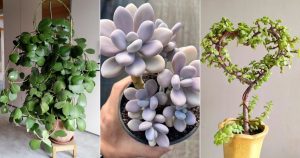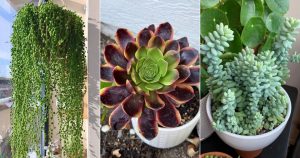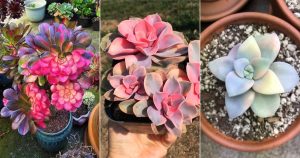Do you love plants that are plump, compact, and ready to take over the space in style? Get your hands on the Best Types of Pachyphytum!
Native to Mexico, these Pachyphytum varieties make perfect centerpieces with their compact shape and pastel color palette. So, if you are confused about which one to choose from, we have some of the best varieties for your reference!
Get to Know about these 4 Inch Succulents too
Finest Types of Pachyphytum
1. Blue Haze
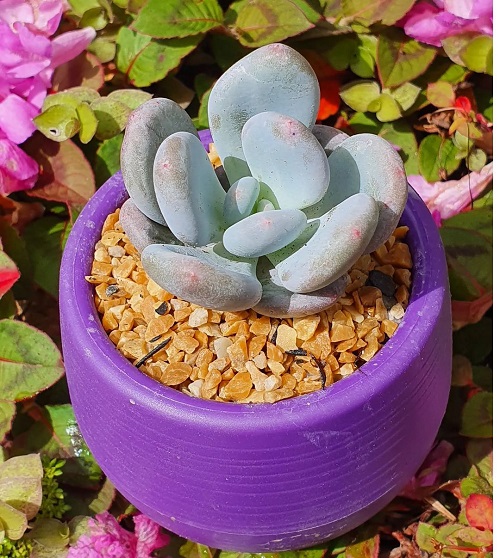
Botanical Name: Pachyveria ‘Blue Haze’
Popular as Blue Pearls Succulent, this plant produces cute chubby leaves that look dusted in blue color narrowed into red tips. It does well in both sunny spots and light shade, making it a low-maintenance addition.
2. Bracteosum
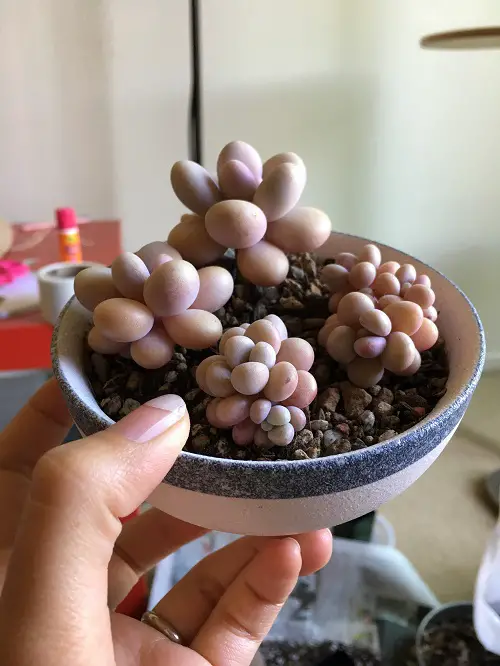
Botanical Name: Dendrobium bracteosum
Native to Mexico, this succulent is also popular as large-bracted Pachyphytum. It has plump, silver-grey leaves that can turn pink in the sunlight and occasionally send out unique flower spikes.
3. Aduncum
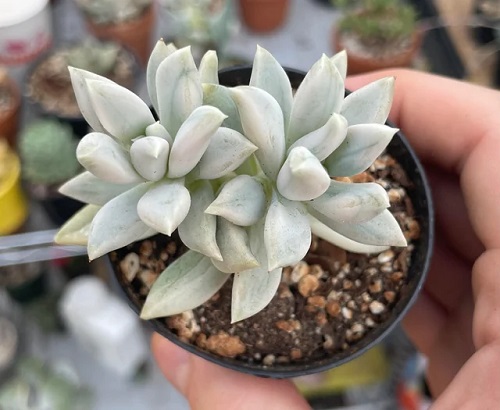
Botanical Name: Piper aduncum
Pachyphytum Aduncum stands out with its pointy, elongated leaves that grow straight from the stem. These leaves come in different shades, like light green or gray-white, giving the plant a subtle elite charm.
4. Caesium
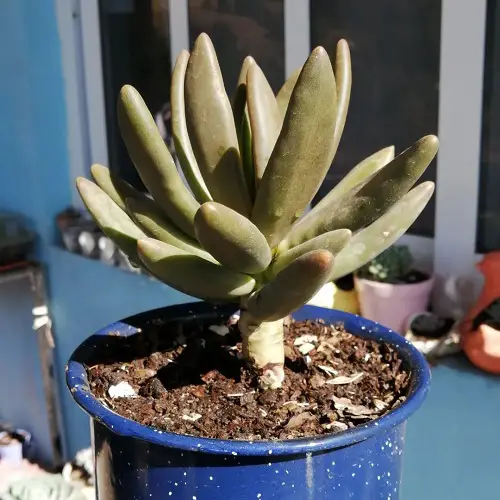
Botanical Name:Pachyphytum hookeri
This small succulent isn’t a fan of frosty environments but can handle heat and sunlight pretty well. Grow it in well-drained soil, and it might also surprise you with flower spikes in the spring or fall months.
5. Brevifolium
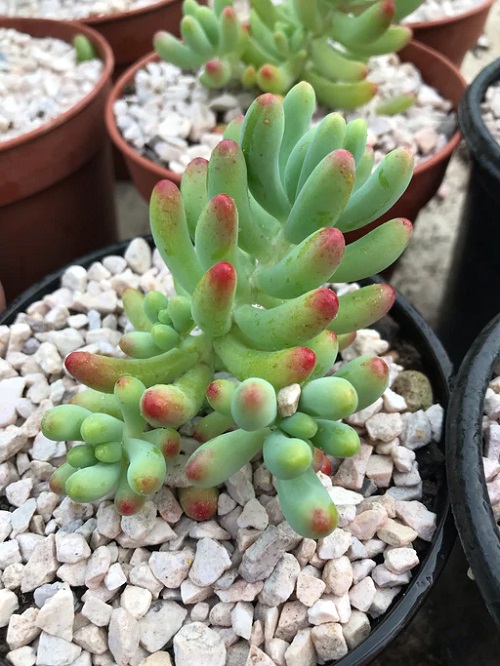
6. Claviflorum
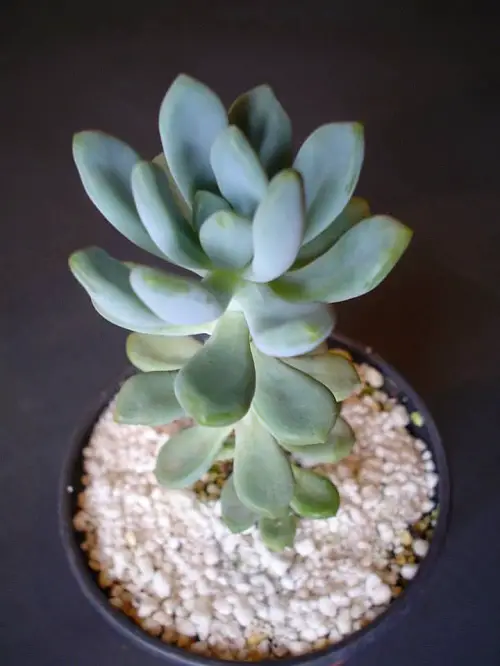
Botanical Name: Acmenosperma claviflorum
Pachyphytum claviflorum stands out in the succulent family with its soft-hued, powder-coated leaves that often surprise with delicate blooms. Perfect for warm, sunny spots, it’s a sturdy choice for gardeners in hotter climates.
7. Compactum
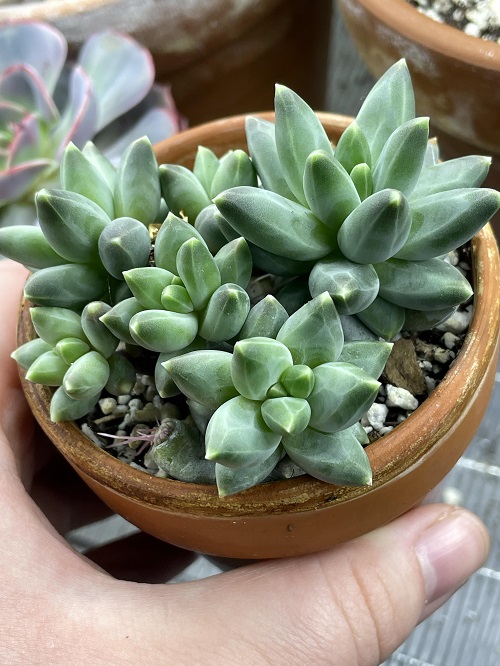
Botanical Name: Trianthema compactum
Pachyphytum Compactum, with its gemstone-like appearance, has blue-green leaves that may show hints of violet under cold stress. It’s drought-tolerant and effortlessly fills up mini containers.
8. Coeruleum
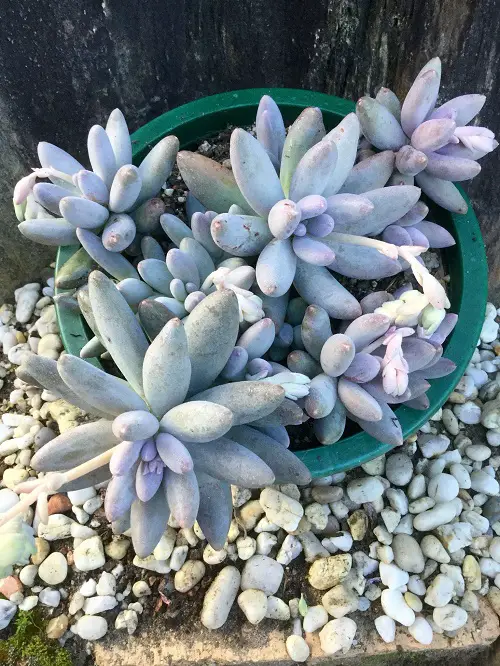
Botanical Name: Oxypetalum coeruleum
This cute succulent with blue-purple leaves turns pink in bright light. It’s great for terrariums and flowers in spring, adding a seasonal surprise to its pretty appearance.
9. Fittkaui
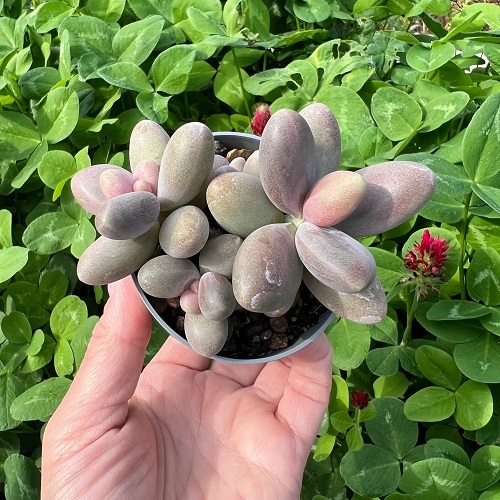
Botanical Name: Pachyphytum fittkaui Moran
With its unusual finger-like, bluish-green leaves, Pachyphytum Fittkaui is a quirky addition to any succulent collection. Thriving under the full sun, it can grow substantially large and develop a pink to purple blush.
10. Garciae
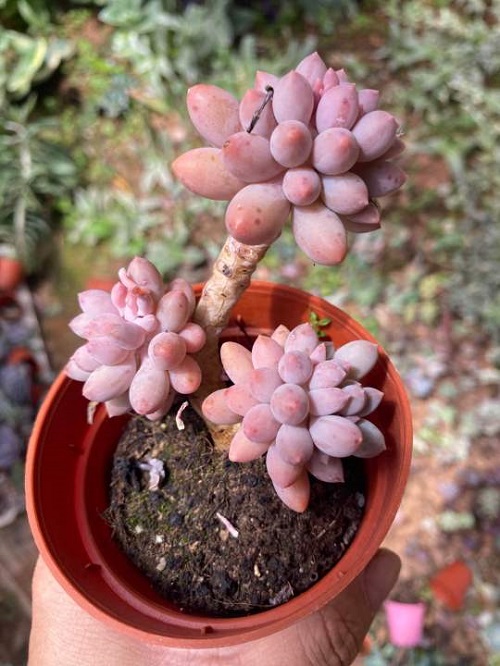
Botanical Name: Litsea garciae
This low-maintenance and sun-loving succulent features charming round leaves tipped in red. This plant is a foolproof choice for brightening up any spot with its unique foliage.
11. Glutinicaule
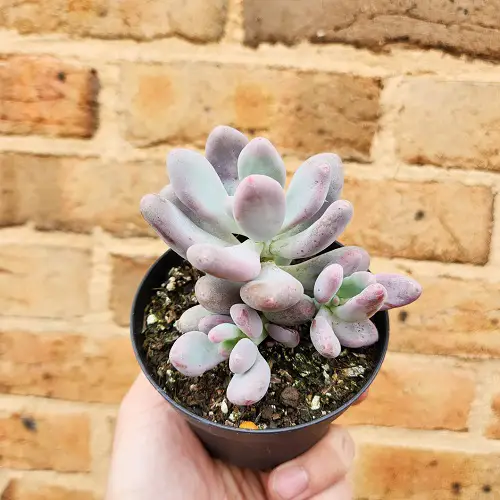
Botanical Name: Pachyphytum glutinicaule moran
This succulent can grow tall, with colors ranging from pink to silver depending on conditions like water and light. Its flowers hang from tall stalks and add a delicate touch to its appearance.
12. Hookeri

Botanical Name: Echeveria hookeri
Hookeri’s slow-growing and makes a great indoor plant with its cushioned leaves ranging from green to orange. Plus, its leaves are coated in a powdery white layer, giving it the typical Pachyphytum look.
13. Kimnachii
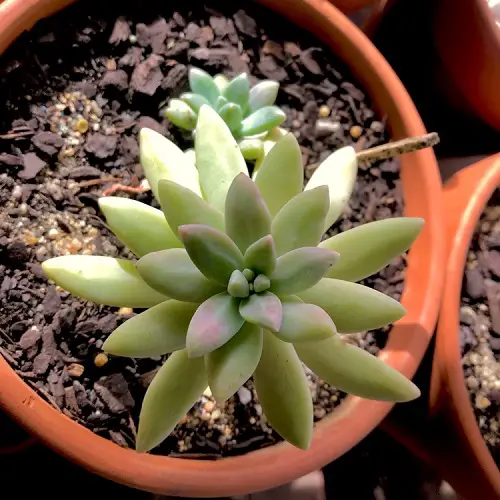
Botanical Name: Pachyphytum kimnachii
Popular for its plump, water-rich leaves in a kaleidoscope of greens, oranges, and sometimes purples, Pachyphytum Kimnachii brings a vibrant burst of color. Plus, its tall spikes topped with bell-shaped flowers add an ornamental touch to its lush foliage.
14. Longifolium
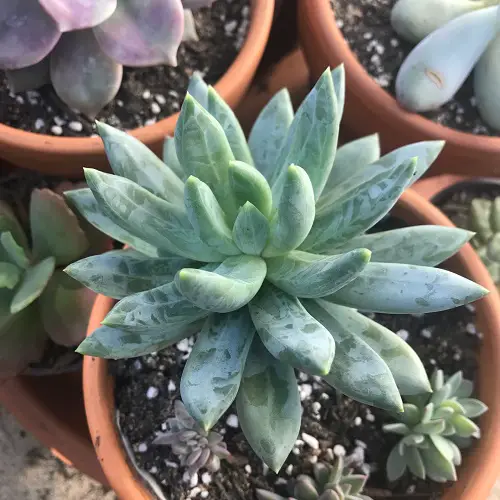
Botanical Name: Pachyphytum longifolium
Pachyphytum Longifolium has thick, silver leaves with a powdery coating that turns pink in winter sunlight. With a subtle textured appearance, it makes an attractive addition to any succulent collection!
15. Machucae
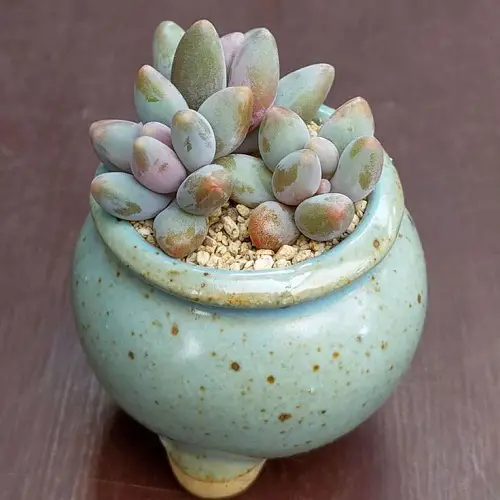
Botanical Name: Pachyphytum Machucae
Also known as the “baby finger succulent,” Machucae charms with chubby, lavender leaves that mature to shades of mango and pink. Its protective wax coating not only shields it from the sun but also gives it a unique matte appearance.
16. Moon Silver
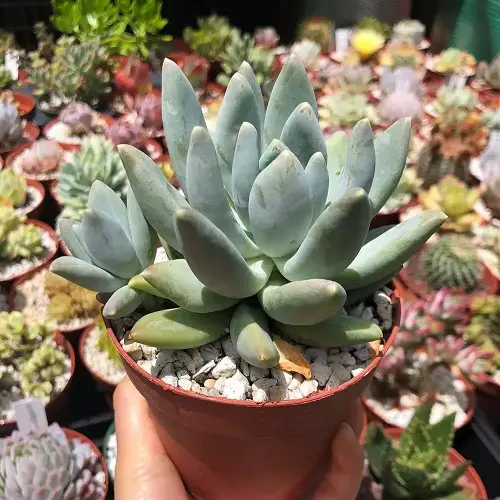
Botanical Name:Pachyphytum ‘Moon Silver’
Pachyphytum Moon Silver features pastel foliage with a grainy texture, making it stand out. It’s ideal for moon gardens or night-themed terrariums, where its silvery foliage vibes well with the lunar-inspired landscape.
17. Oviferum
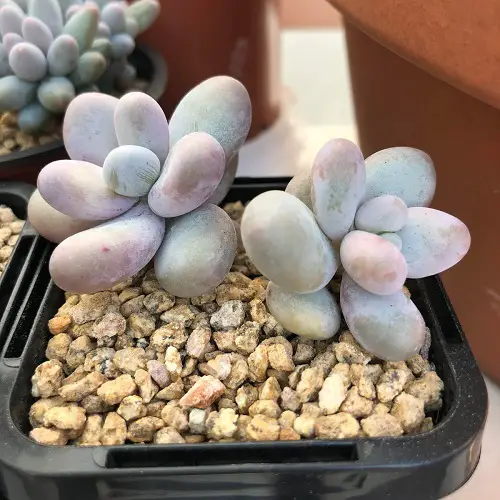
Botanical Name: Pachyphytum oviferum
With its signature chubby leaves, this variety can be a perfect centerpiece on your coffee tables and rock gardens. Pair it with contrasting stones for an interesting textured decor.
18. Sodale
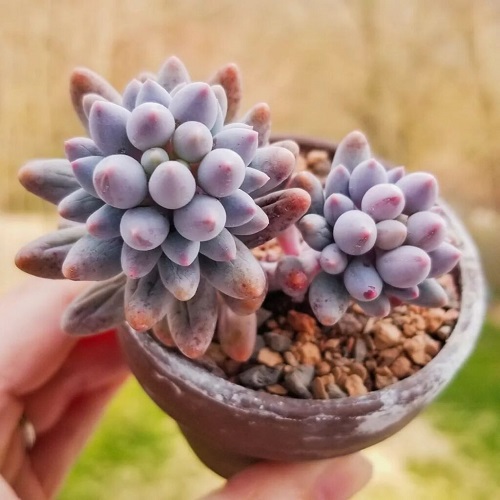
Botanical Name: Pachyphytum sodale
Pachyphytum Sodale has clusters of fleshy leaves in various shades of red, making it an eye-catching succulent. It blooms from June to August and is easy to care for, preferring bright locations with sparse watering.
19. Saltense
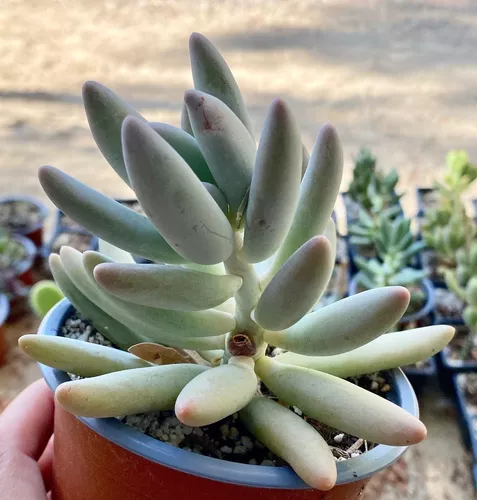
Botanical Name: Pachyphytum Saltense
This compact plant features small rosettes of leaves that beautifully blend green and pink hues. Place it on your east or west-facing windows and enjoy its subtle color shifts with the change in light intensity.
20. Starburst
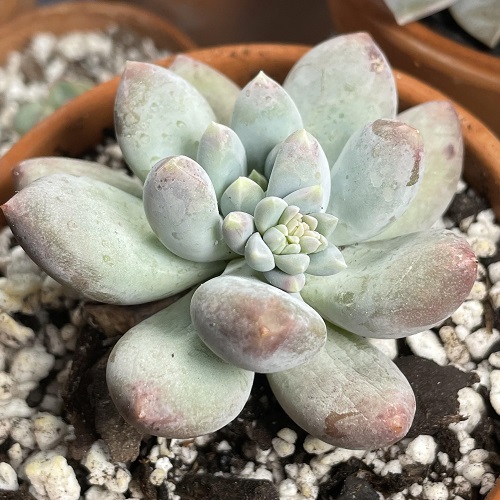
Botanical Name: Pachyphytum Starburst
Pachyphytum Starburst has plump rosettes with leaves ranging from ice mint to purple, with reddish tips. Plus, its flower stalks bear small, bell-shaped flowers in spring, adding another layer of beauty.
21. Viride
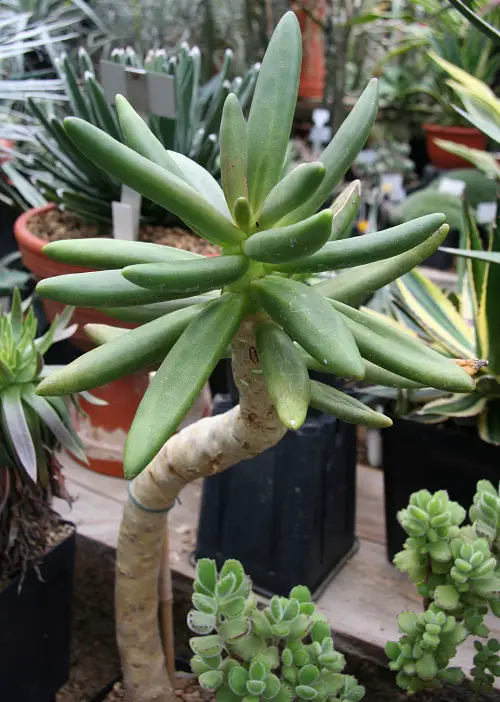
Botanical Name: Pachyphytum viride Walther
Viride boasts cascading stems adorned with deep green leaves that can develop hints of violet-red with sunlight exposure. Its ability to drape gracefully makes it an excellent choice for both indoor and outdoor options.
22. Werdermannii
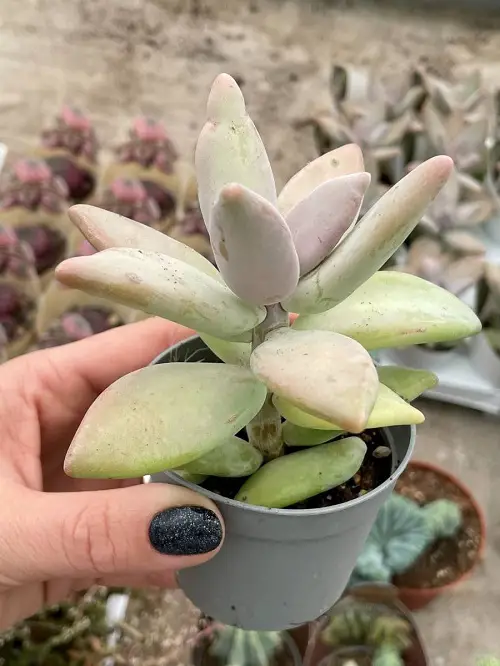
Botanical Name: Pachyphytum Werdermannii
Pachyphytum Werdermannii leaves are arranged in a way that they look like a plump green star from the top. Plus, they change color throughout the year, from green to blue to rose pink, especially in sunny environments.


